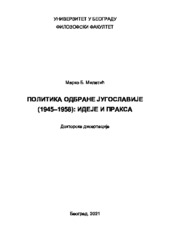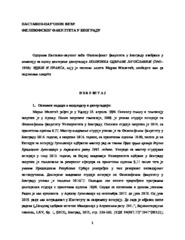Prikaz osnovnih podataka o disertaciji
Политика одбране Југославије: (1945-1958)
Yugoslav defense policy (1945-1958): ideas and practice
| dc.contributor.advisor | Životić, Aleksandar | |
| dc.contributor.other | Dimić, Ljubodrag | |
| dc.contributor.other | Radojević, Mira | |
| dc.contributor.other | Terzić, Milan | |
| dc.contributor.other | Dimitrijević, Bojan B. | |
| dc.creator | Miletić, Marko | |
| dc.date.accessioned | 2022-05-31T09:25:56Z | |
| dc.date.available | 2022-05-31T09:25:56Z | |
| dc.date.issued | 2021-10-29 | |
| dc.identifier.uri | https://eteze.bg.ac.rs/application/showtheses?thesesId=8601 | |
| dc.identifier.uri | https://fedorabg.bg.ac.rs/fedora/get/o:25749/bdef:Content/download | |
| dc.identifier.uri | https://plus.cobiss.net/cobiss/sr/sr/bib/53116169 | |
| dc.identifier.uri | https://nardus.mpn.gov.rs/handle/123456789/19105 | |
| dc.description.abstract | Докторска дисертација Политика одбране Југославије (1945–1958): Идеје и пракса је заснована на необјављеној архивској грађи Архива Југославије, Војног архива у Београду, Дипломатског архива Министарства спољних послова Републике Србије, Историјског архива Београда, Историјског архива у Чачку и Музеја ваздухопловства, на објављеним документима, мемоарским записима, штампи, као и на стручној историографској литератури. У складу са темом као посебно корисни показали су се архивски фондови који су се односили на рад Савезне владе, Савеза Комуниста Југославије и Југословенске народне армије. Рад хронолошки обухвата период од 1945. године, када је завршен Други светски рат и створена социјалистичка Југославија до 1958. године када је донет нови Закон о народној одбрани, чиме је систем одбране који је до тада примењиван измењен. Најшире посматрано, основни циљ нашег истраживања састојао се у анализи југословенске одбрамбене политике. Анализом њених главних токова настојали смо да утврдимо како се она мењала у току времена, као и који су фактори на то имали највећи утицај. Намера нам је била да покажемо у којој мери су спољнополитички и геостратегијски положај Југославије, али и безбедносни проблеми који су из њих произилазили утицали на развој југословенске одбрамбене политике и на који начин су се у складу са тим променама, мењали и југословенски ратни планови. Исто тако, циљ нам је био да анализом дођемо до сазнања како се и на који начин током посматраног периода мењала и развијала југословенска војна доктрина. С обзиром на то да је одбрана земље у условима савременог рата захтевала да се још у миру најбрижљивије изврше све неопходне припреме било је неопходно одредити ко ће се о томе старати и ко ће одређивати за то потребне мере. Пошто је људски фактор, један од најбитнијих у систему одбране, циљ нам је био да покажемо како су се школовале војне старешине Југословенске (народне) армије и како се старешински кадар у посматраном периоду трансформисао од партизанских кадрова без потребног теоријског војног знања, до савремених официра спремних да својим знањем решавају све проблеме који су пред њих постављани. Настојали смо и да кроз анализу војне обуке и ванармијског војног васпитања установимо у којој мери су југословенски грађани били способни да бране своју земљу у случају стране агресије на њу. Приказ и анализа развоја југословенске војне привреде, која је готово у потпуности била уништена у току Другог светског рата, развоја саобраћајне инфраструктуре, изградње војних објеката и њиховог утицаја на одбрамбену моћ земље, али и на укупни друштвени развој у Југославији, такође је представљао један од значајних циљева нашег истраживања. Посебну пажњу посветили смо и анализи утицаја науке на политику одбране, пре свега кроз примере рада војнотехничких, војноисторијског и војногеографског института, али и кроз нуклеарна истраживања која су 1950-их почела да се спроводе у Југославији. | sr |
| dc.description.abstract | Phd thesis Yugoslav defense policy (1945–1958): Ideas and practice is based on the unpublished sources from the Archive of Yugoslavia, Military Archive in Belgrade, Diplomatic Archive of the Ministry of Foreign Affairs of the Republic of Serbia, Historical Archives of Belgrade, Historical Archives of Čačak, Aeronautical Museum in Belgrade, on the published resources, memoir notes and press, as well as on the professional historiography literature. In accordance with the topic, the archives that referred to the work of the Federal Government, the League of Communists of Yugoslavia and the Yugoslav People's Army proved to be especially useful. The work chronologically covers the period from 1945, when the Second World War ended and socialist Yugoslavia was created, until 1958, when the new Law on National Defense was passed, which changed the defense system that had been applied until then. Broadly speaking, the main aim of our research was to analyze Yugoslav defense policy. By analyzing its main trends, we tried to determine how it changed over time, as well as which factors had the greatest influence on it. Our intention was to show the extent to which the foreign policy and geostrategic position of Yugoslavia, as well as the security problems that arose from them, influenced the development of Yugoslav defense policy and how Yugoslav war plans changed in accordance with these changes. Also, our aim was to use the analysis to find out how and in what way the Yugoslav military doctrine changed and developed during the observed period. Considering that the defense of the country in the conditions of the modern war demanded that all necessary preparations be made most carefully in peace, it was necessary to determine who would take care of them and who would determine the necessary measures for that. Since the human factor is one of the most important in the defense system, our aim was to show how the military officers of the Yugoslav (People's) Army were educated and how the officers in the observed period were transformed from partisan personnel without the necessary theoretical military knowledge to modern officers ready to use their knowledge to solve all the problems that are set before them. We also tried to establish, through the analysis of military training and non-military military education, the extent to which Yugoslav citizens were able to defend their country in the event of foreign aggression against it. Review and analysis of the development of the Yugoslav military economy, which was almost completely destroyed during the Second World War, the development of transport infrastructure, construction of military facilities and their impact on the country's defense power, but also on overall social development in Yugoslavia, was also one of significant aims of our research. We also paid special attention to the analysis of the impact of science on defense policy, primarily through examples of the work of military technical, military history and military geographic institutes, but also through nuclear research that began to be conducted in Yugoslavia in the 1950s. | en |
| dc.format | application/pdf | |
| dc.language | sr | |
| dc.publisher | Универзитет у Београду, Филозофски факултет | sr |
| dc.rights | openAccess | en |
| dc.rights.uri | https://creativecommons.org/licenses/by-nc-nd/4.0/ | |
| dc.source | Универзитет у Београду | sr |
| dc.subject | Југославија | sr |
| dc.subject | Phd thesis Yugoslav defense policy (1945–1958): Ideas and practice is based on the unpublished sources from the Archive of Yugoslavia, Military Archive in Belgrade, Diplomatic Archive of the Ministry of Foreign Affairs of the Republic of Serbia, Historical Archives of Belgrade, Historical Archives of Čačak, Aeronautical Museum in Belgrade, on the published resources, memoir notes and press, as well as on the professional historiography literature. In accordance with the topic, the archives that referred to the work of the Federal Government, the League of Communists of Yugoslavia and the Yugoslav People's Army proved to be especially useful. The work chronologically covers the period from 1945, when the Second World War ended and socialist Yugoslavia was created, until 1958, when the new Law on National Defense was passed, which changed the defense system that had been applied until then. Broadly speaking, the main aim of our research was to analyze Yugoslav defense policy. By analyzing its main trends, we tried to determine how it changed over time, as well as which factors had the greatest influence on it. Our intention was to show the extent to which the foreign policy and geostrategic position of Yugoslavia, as well as the security problems that arose from them, influenced the development of Yugoslav defense policy and how Yugoslav war plans changed in accordance with these changes. Also, our aim was to use the analysis to find out how and in what way the Yugoslav military doctrine changed and developed during the observed period. Considering that the defense of the country in the conditions of the modern war demanded that all necessary preparations be made most carefully in peace, it was necessary to determine who would take care of them and who would determine the necessary measures for that. Since the human factor is one of the most important in the defense system, our aim was to show how the military officers of the Yugoslav (People's) Army were educated and how the officers in the observed period were transformed from partisan personnel without the necessary theoretical military knowledge to modern officers ready to use their knowledge to solve all the problems that are set before them. We also tried to establish, through the analysis of military training and non-military military education, the extent to which Yugoslav citizens were able to defend their country in the event of foreign aggression against it. Review and analysis of the development of the Yugoslav military economy, which was almost completely destroyed during the Second World War, the development of transport infrastructure, construction of military facilities and their impact on the country's defense power, but also on overall social development in Yugoslavia, was also one of significant aims of our research. We also paid special attention to the analysis of the impact of science on defense policy, primarily through examples of the work of military technical, military history and military geographic institutes, but also through nuclear research that began to be conducted in Yugoslavia in the 1950s. | en |
| dc.subject | политика одбране | sr |
| dc.subject | хладни рат | sr |
| dc.subject | Информбиро | sr |
| dc.subject | НАТО | sr |
| dc.subject | војна привреда | sr |
| dc.title | Политика одбране Југославије: (1945-1958) | sr |
| dc.title.alternative | Yugoslav defense policy (1945-1958): ideas and practice | en |
| dc.type | doctoralThesis | |
| dc.rights.license | BY-NC-ND | |
| dcterms.abstract | Животић, Aлександар; Димитријевић, Бојан Б.; Димић, Љубодраг; Радојевић, Мира; Терзић, Милан; Милетић, Марко; Politika odbrane Jugoslavije: (1945-1958); | |
| dc.identifier.fulltext | http://nardus.mpn.gov.rs/bitstream/id/143357/Referat_Miletic.pdf | |
| dc.identifier.fulltext | http://nardus.mpn.gov.rs/bitstream/id/143356/Disertacija_12293.pdf | |
| dc.identifier.rcub | https://hdl.handle.net/21.15107/rcub_nardus_19105 |



